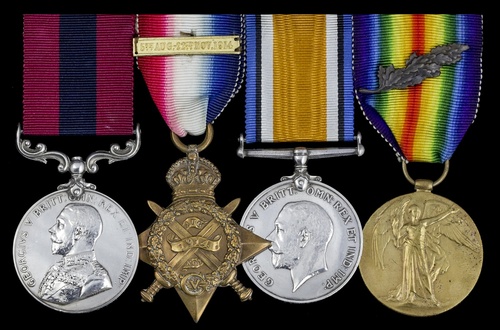
Auction: 19001 - Orders, Decorations and Medals
Lot: 551
An 1914 D.C.M. group of four to Corporal T. Tinker, Lancashire Fusiliers, who received his medal from King George V in Northern France for gallant conduct on the Aisne when he rescued several wounded comrades under heavy fire. He was later wounded and taken Prisoner of War on the opening day of the Third Battle of the Scarpe
Distinguished Conduct Medal, G.V.R. (552 Pte. T. Tinker. 2/Lanc: Fus:); 1914 Star, copy clasp (552 Pte. T. Tinker. 2/Lan: Fus.); British War and Victory Medals, copy M.I.D. oak leaves (552 Cpl. T. Tinker. Lan. Fus.), good very fine (4)
D.C.M. London Gazette 17 December 1914.
'For gallantry in removing wounded men into cover under a heavy fire.'
Thomas Tinker was born on 12 August 1881 at Prestwich, Lancashire, the son of Thomas Tinker of 26 Bury Old Road, Heaton Park. As a young man he joined his father in the butchery business, but joined the Army on 20 December 1904. He initially enlisted into the 1st Battalion, Lancashire Fusiliers and saw service in Malta, Egypt and India, completing his term in 1913.
Following the outbreak of the Great War, Tinker joined the 2nd Battalion of the Lancashire Fusiliers who were stationed at Dover in August 1914. At that time his original Battalion, the 1st Lancashire Fusiliers, were still in India, whilst his Battalion were retained at home, the result of a last minute decision to defend Britain from a possible German landing.
However, the Battalion did finally proceed to France, landing at Boulogne on 20 August in time to provide infantry reinforcements at the Battle of Le Cateau. Tinker arrived in France on 26 August 1914 where he received a baptism of fire which constituted the Battles of the Marne, Aisne and Messines. On the Aisne, where Tinker won the D.C.M., the Battalion suffered 14 killed and 56 men wounded. He also added a 'mention' to his laurels (London Gazette 4 December 1914, refers).
According to the Radcliffe Guardian and Whitefield Observer, Tinker remained on the Western Front throughout 1915, where he had the distinction to meet The King and have his well-earned award pinned to his chest. As casualties mounted though, his luck began to run short:
'With miraculous fortune, Pte. Tinker has escaped the bullets, but in the Battle of Ypres he was caught by the German poison gas and was saved in an unconscious condition. He was seriously ill after this experience for 18 days.'
As a consequence of this gas attack and sheer 'war weariness', Tinker returned home to Prestwich in September 1915 where he was greeted as a hero - on his arrival at the railway station he was met by a bugle band and a company of men to lead a flag-lined procession on his behalf to the Council offices where speeches awaited. For Tinker, the adulation was perhaps too much and he was keen in his speech to impart the duty of certain sections of society to enlist:
'We want a lot more single men out there," he said, "and fewer of the married. I do not think you realise what is going on. I have been at it now for some time, and I have had to rough and tumble it a bit, but I do not see why others should not do the same.'
Tinker then spent the remainder of his leave visiting his old school, the Prestwich National School, and at the same time met a number of wounded soldiers from the Stanley House Hospital - he was given a 'hearty cheer' from both parties! He was also presented a clock by the Rector of Prestwich to go with the silver cigarette case given by the Council.
Returning to his Battalion, Tinker likely spent the winter training and preparing for the Battle of the Somme as part of the 36th (Ulster) Division. Once again, he survived the horrors of trench warfare which he had spoken about so eloquently a year beforehand, but his luck was to finally run out on 3 May 1917. Whilst serving with 'C' Company, 2nd Battalion, Tinker was wounded in the left hand by shrapnel and captured at Roubaix as he and his men attempted to push east from Monchy, break through the Boiry Riegel and reach the Woton Stellung - a major German defensive fortification which formed part of the northernmost section of the Hindenburg Line. He would see out the war at Limberg Camp.
Following repatriation, Tinker returned to his civilian occupation as a butcher. He married Mary Evans at Ellesmere on 2 July 1921 and died in March 1965. The first D.C.M. to be awarded to the Lancashire Fusiliers during the Great War was to Sergeant H. Duckers on 11 November 1914. The next awards were four D.C.M.'s, including Tinker; sold with original Soldier's Small Book, newspaper cuttings, copied MIC, and research.
Subject to 20% VAT on Buyer’s Premium. For more information please view Terms and Conditions for Buyers.
Sold for
£2,300
Sale 19001 Notices
Now accompanied by the original large illuminated certificate from the Urban District of Prestwich, dated 15 September 1915.




